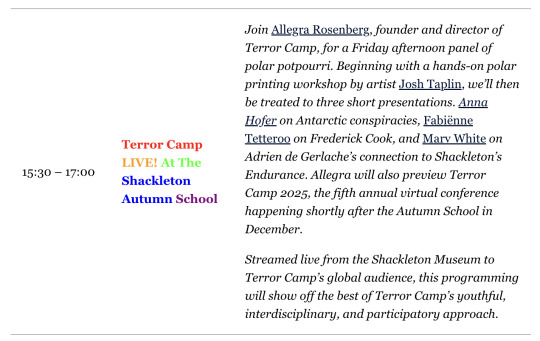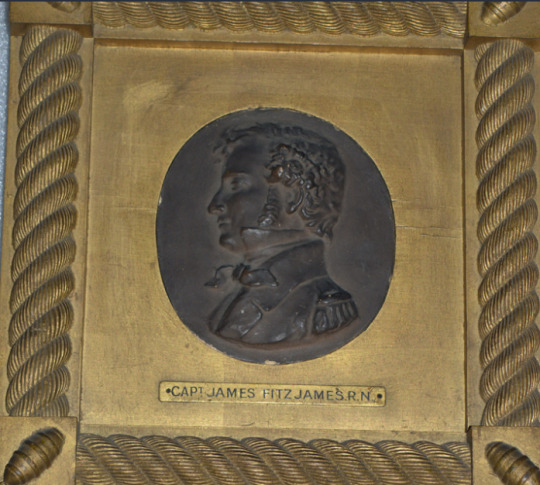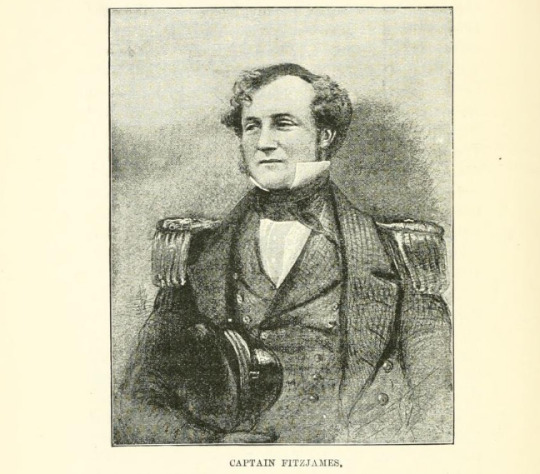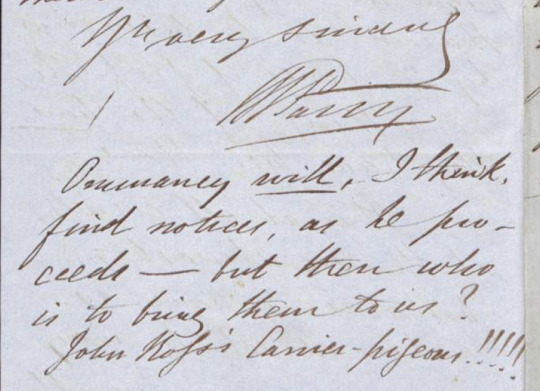Captain James Fitzjames RN (1813-1848?) research by Fabiënne Tetteroo MA www.jamesfitzjames.com
Don't wanna be here? Send us removal request.
Text

The French Army was serving looks in the 18th century.
[General Jean-Joseph Desolle (1767-1828), by Louis-Edouard Rioult, 1836. After Louis Gauffier, before 1801. Musée de l'Armée, Paris.]
3 notes
·
View notes
Text
I'm gonna be talking about my favourite little liar Frederick Cook. :-)

Terror Camp is coming to the Shackleton Autumn School in Ireland!
We'll hosting an art workshop + polar panel presentation on Friday, October 24th to kick off the conference weekend in Athy.
The panel will be streamed live from the new museum building for everyone, but if you're interested in attending in person and you're under 40, please get in touch with us via DM or email for a chance to grab discounted tickets 🥳
130 notes
·
View notes
Text
HMS Terror muster book (1845)

Lieutenant On Duty, he's my fave.
[The National Archives, ADM 38/1962]
#franklin expedition#naval history#royal navy#polar exploration#age of sail#francis crozier#john irving#edward little
173 notes
·
View notes
Text
Recommendation


You see me do a lot of complaining about how bad most of the books about the Franklin Expedition are. Now, this book , Arctic Exploration in the Nineteenth Century, is amazing and my most favourite! Unfortunately it's an expensive academic publication that is therefore not easily accessible. But the topics of the various essays are so good and thought-provoking! All with sources properly cited etc. Well worth tracking down either legally or illegally.🙃
53 notes
·
View notes
Note
Almost all of the Franklin Expedition and adjacent books are doing all of the things that OP describes as red flags. They are more concerned with telling a good story or a certain narrative than accurately passing on factual information. Academic books can also contain mistakes and misinterpretations, but at least they have footnotes/endnotes to see where they get their info from or to what they are responding.
Do you have any tips on doing accurate research for people without access to formal education
Sure! This can't be one size fits all for every field, but I can give some starting points for history.
If you're reading a book, here's what to consider:
1. Are there footnotes or endnotes? In academia this is our way of being transparent with each other about where you got information. If a book doesn't have them, they're more interested in telling a good story than being accountable to their peers. That's a red flag.
2. Don't trust claims that seem very specific but don't have a source. Broad claims can be the author's analysis. But specific things "so and so said this" "there was a rumor that (x)" should be coming from somewhere and it is the author's job to tell you where.
3. Look out for choppy quoting. Even if someone has a source, they may not be using it well. If someone is paraphrasing a lot and only uses bits and pieces of the text while also using a lot of ellipses, you will want to try to find the whole text to make sure it's being quoted fairly.
4. Look at the publication date. Knowledge changes with time and old books tend to be outdated. You don't have to stick to the academic rule of thumb of "25 years is the threshold for new scholarship" but do be aware that if something is over 50 years old, many many people have likely revisited and revised what it's saying. Not that new books can't also be bad and incorrect, but they tend to be working with better tools generally.
5. Look up the author. I cannot stress this one enough. The author's background and political convictions can matter a lot to how they interpret things. For example, one of the biographies people tend to pick up about my dissertation topic is from the late 1920s by a man who later applied to join the NSDAP. That fact really can't be separated from his interpretations no matter how hard people try.
6. Stop reading if someone is making a lot of moral or personal judgements on a historical figure. I'm talking about the "Elizabeth I was a frigid hag and men found her ugly"-esque takes, not things like calling historical atrocities morally bad. Does it feel like bitchy gossip? That sort of thing is unprofessional, uninformative, and means someone has an axe to grind. Spite can be motivation for research, but axe grinding shouldn't show up clearly in published work.
These are things to keep in mind to make sure you're getting better information. Others are free to add on for their field or if there's something I forgot.
One very important thing to add: professors and academics like people emailing them about their research. You can do that! You can ask for copies of pay walled articles. You just have to go through the mortifying ordeal of expressing interest in an email.
3K notes
·
View notes
Text

A very detailed report on the wrecks of Erebus and Terror from Parks Canada, including drawings of the wrecks and the items found. It's a huge document, can't wait to properly read it. READ IT HERE.

[Figure 5.2.1: Terror and Erebus, Plan of Upper Deck (as Fitted) overlaid with the upper deck site plan (Image: B. Lockhart, Parks Canada; Drawing: C. Pillar, Parks Canada; 89M2017-101-1; Ship plan: National Maritime Museum Greenwich, London (ZAZ 5675, J1409))]
671 notes
·
View notes
Note
Do we know if John Barrow Jr. ever got a copy of either of the Fitzjames Daguerreotypes? I know Fitzjames didn’t list him as one of the intended recipients, but I also know others wrote about how copies of the daguerreotypes were available from the man who took them. I don’t know, something about the possibility of Barrow Jr. not having an image of someone he clearly loved so much is breaking my heart…
As far as I know, Barrow Jr. did not have a copy of Fitzjames' Daguerreotype, even though he could have easily obtained one. However, I haven't been able to track down everything from his collection of art yet. He thankfully donated a lot to museums, but some items remained in his family, who appear to have sold almost everything connected to their ancestors. Fitzjames' family must have had copies of the Daguerreotype, so those must be out there somewhere and perhaps Barrow Jr. had a copy too that's now just hidden in someone's private collection.
But! Barrow Jr. definitely had at least two portraits of Fitzjames in his home, and a third if you count the one in The Arctic Council. He donated this portrait plaque to the Maritime Museum in 1892.

[National Maritime Museum Greenwich, OBJ0551]
And in 1875, Barrow Jr. donated a watercolour portrait of Fitzjames to the Royal Geographical Society but guess what? THEY HAVE LOST IT. They don't have it anymore and have no idea what happened to it! It was on display in their museum until the 1920s, and after that POOF, GONE. Obviously I'm obsessed with finding it. This is a copy that was made of it for Albert Markham's Sir John Franklin biography (1891). It's clearly based on the Daguerreotype:

30 notes
·
View notes
Text
On 23 May 1861, a dinner was organised by the King of Hawaii, Kamehameha IV, in honour of Lady Franklin's visit.
Here is the menu:

[Barrow Bequest, British Library]
24 notes
·
View notes
Text
19 May 1845: Franklin Expedition leaves England

Sir John Franklin's Arctic Expedition in HMS Erebus & Terror sailed out from Greenhithe on Monday 19 May 1845. And as we all know, they sadly never returned.
[Illustrated London News, 24 May 1845. My collection]
141 notes
·
View notes
Text









John Barrow murals
Ulverston, Cumbria
#sir john barrow#polar exploration#franklin expedition#I need to see this next time#ulverston#naval history
32 notes
·
View notes
Note
Hello! Big admirer of your work so I hope this isn’t too strange of a question.
Since your research focuses so much on a single historical figure (his life, his relationships) how do you keep a degree of emotional distance from Fitzjames the man? Is objectivity possible?
Also, I was wondering if you ever dream about him 🙂
Hi, thank you so much and sorry for my late reply! While it is common to develop an emotional connection to your research topic, which has certainly happened to me after almost 4 years, my research itself is academic. On a personal level I am fond of Fitzjames, but my goal is to publish a work that analyses and discusses history according to academic standards and not to write a hagiography or adventure novel. You won't even be able to tell that I like him, haha. On social media you can sometimes see me get a little more fandom-y with it, but that will have no place at all in my books.
Do I dream about him? That's such a cute question. Unfortunately I almost never remember my dreams, and so I have never dreamt about Fitzjames as far as I know. Which is strange because for the past 4 years I have thought about him every day while doing research.
17 notes
·
View notes
Text
The top of Sir John Barrow's Monument in Ulverston. Love how they put John & James Ross together.🥲 Only the latter donated to the construction of the monument.


#franklin expedition#naval history#royal navy#polar exploration#james fitzjames#francis crozier#john franklin#sir john ross#james clark ross#sir john barrow#ulverston
77 notes
·
View notes
Text
Officers group pic, 1867

'Officers of HMS Arethusa in Naples, April 1867'. From photo album by Casper Joseph Baker, at auction Dominic Winter, May 2025.
95 notes
·
View notes
Text
Sir John Ross

Steel engraving, c. 1840. [My collection]
24 notes
·
View notes
Text
John Ross's Carrier-pigeons!!!!!

Edward Parry to William Bailie-Hamilton, 5 October 1850 [ADM 7/190]
Lol, Parry is so funny. In October 1850, the news of the Franklin Expedition discoveries on Beechey Island reached England by a small ship sent by Lady Franklin, the Prince Albert. Parry thinks messages by Franklin will be found as the search proceeds, but how will they be brought to England with no additional ship out there?
John Ross brought some pigeons on the Felix to send news back to England. One of the pigeons actually made it back to Scotland, though! However, without the message it carried. The other ones died in the Arctic. https://pigeons-of-war.com/2024/05/17/pigeons-in-the-arctic-part-iii-sir-john-rosss-1850-51-search-for-the-lost-franklin-bay-expedition/
31 notes
·
View notes
Text
John's (and Kingston's) Letters to Malcolm
Very excited to be sharing these when properly sorted!





Sources: Acc.6990/9, Acc.6684/15-16
(The second I believe is a ‚W‘ (?) but of course all I see is an upside-down <3)
Today I visited the National Library of Scotland in Edinburgh and found the abundance of letters from Irving and Kingston to Malcolm. Although the ones from John make up the majority of Bell's book and thus are already known, I have found that Bell actually omitted a lot of what John actually wrote (such as the way he kept referring to his brother David as ‚rather foolish‘ which I find is hilarious to censor, drawing little sketches comparing the shape of ships, and either seriously or jokingly mentioning burning Malcolm’s letters (pictured - if I am reading it correctly?)); and it was a treasure to see the nuances of his handwritten letters: The way he'd cross out and amend mistakes, press too hard or at an angle on the pen and spray ink everywhere, plan the structure of his writing so that the wax seal didn’t damage what he wrote, getting less legible in his handwriting as he got to the end of his letter or was presumably in a hurry etc. And Kingston, too, in the majority of his letters to Malcolm would endearingly enquire to see if he’d heard any news from John or his brother Lewis from his time in the navy to his life in Australia.



The "Belvidera" Boys from left to right as far as I can verify: Malcolm, Irving, and Kingston.
I'll sort, post, and transcribe these as soon as I can, as there is a lot of work to do, (and hopefully avoid any copyright issues that may arise)!
Context if needed under cut:

Source: https://arctonauts.com/2023/01/17/bell-full/
#john irving#franklin expedition#william elphinstone malcolm#naval history#AMAZING WORK OP!!#Can't believe nobody bothered to look for Irving's letters there before
99 notes
·
View notes
Text
JF

You may see many people refer to Fitzjames as JFJ (not me), but Fitzjames' initials are JF. Not he nor any of his contemporaries ever called him JFJ. Just saying for those who didn't know!
[Letter Fitzjames to Elizabeth Coningham, 30 June 1845, Private collection]
34 notes
·
View notes